
Al Jolson in The Jazz Singer
Director: Alan Crosland; Writer: Alfred A. Cohn, from the short story and play by Samson Raphaelson
With Al Jolson, May McAvoy, Warner Oland, Eugenie Besserer
Warner Home Video
Available Oct. 16
On Oct. 6, 1927, The Jazz Singer opened on Broadway, kick-starting the revolution that would lead a panicked Hollywood to junk its only product — silent movies — and lurch into the terra incognita of talking pictures. On its own, the Warner Bros. feature was no earth-shaker. Mostly silent (the acting mimed, that is, to an orchestra accompaniment), it had only a few musical sequences, sold to the rafters by the shameless, shimmying Jolson, the Elvis of the 30s. Doing "coon songs" like "Mammy" in blackface seems bizarre, maybe reprehensible now, Jolson's electric personality put the new medium over. The silent film had been a magnificent art form, but by 1930 it was essentially kaput.
As shown in this exemplary package, including the new 85min. documentary The Dawn of Sound: How Movies Learned to Talk, sound on film didn't sprout overnight. It was a three-decade process, pioneered by Thomas Edison and developed by a handful of contentious visionaries. But inventors need showmen to bring their dreams to the marketplace, and the Warner brothers were the four guys to do it. They parlayed their Jazz Singer success with the all-talking picture Lights of New York, featuring the first time a movie gangster telling one of his boys, "Take him for a ride."
There's some filler here (three Warner compilations from the 40s and 50s that use clips from early talkies), but a reliquary of antique gems too, like a 1929 Max Fleischer cartoon, Finding His Voice, that explains the sound-on-film process. There's also the surviving 15mins. from the musical Gold Diggers of Broadway, with several sensational acrobatic dance acts and the pert Nancy Welford leading her chorines in a rendition of "Tip Toe Through the Tulips."
Showbiz historians won't want to miss the package's 24 Vitaphone shorts highlighting stage and vaudeville stars of the 20s. You'll see the young George Burns and Gracie Allen, their act already honed to perfection, in Lambchops. Elsie Janis, famed for entertaining the World War I troops, leads some soldiers in singing an ethnically raw rouser, "The Democratic Army" ("All the Jews and the wops /And the burly Irish cops / They're all in the army now"). Blossom Seeley, whose career in vaudeville, films and cabaret spanned six decades, is shown reprising her act with husband Benny Fields.
The deal-clincher is My Bag o' Tricks, a performance by the previously obscure, now never-to-be-forgotten Trixie Friganza (nee Delia O'Callaghan). A Marie Dressler type with a booming voice and amazing comic precision, she runs through and over a couple of novelty numbers. Friganza had headlined in Broadway plays and musicals; why was she never a movie star? That's part of the piquancy of this excellent set: it answers many questions, raises a few more.